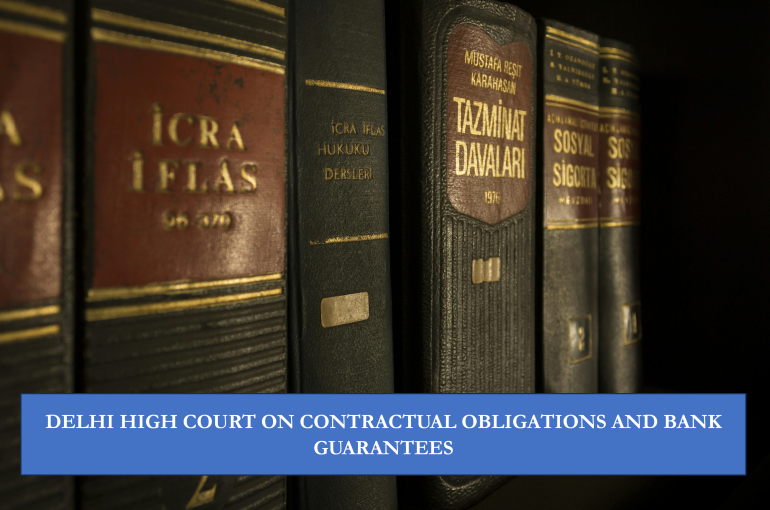DELHI HIGH COURT ON CONTRACTUAL OBLIGATIONS AND BANK GUARANTEES
A judgement pronounced by the Delhi High Court in the matter of GAIL India Ltd. v. UCO Bank case, decided by the Delhi High Court in RFA(OS)(COMM) 5/2024, highlights crucial legal principles concerning the invocation of bank guarantees in contracts and the conditions required for their encashment.
In this appeal, GAIL India Ltd. (Appellant) challenged the rejection of its plaint by the lower court, which dismissed the suit under Order VII Rule 11 of the Code of Civil Procedure (CPC) for failing to disclose a cause of action.
Background of the Case
GAIL India Ltd. and Harisons Industries (Defendant no. 2) entered into a contract for the construction of pipelines and associated facilities. To secure performance under the contract, Harisons Industries furnished a Performance Bank Guarantee (BG) worth Rs. 2,09,53,500/-, issued by UCO Bank (Defendant no. 1). This BG was initially set to expire in October 2012 but was extended upon request until April 25, 2013.
Despite communication between GAIL and UCO Bank, the BG was not extended beyond April 25, 2013, leading to its cancellation. GAIL attempted to invoke the BG by sending a letter on April 15, 2013, stating that if the BG was not extended, it would demand payment. UCO Bank denied receiving this letter and refused to release the guaranteed amount. GAIL then filed a recovery suit for the amount of the BG, which was dismissed by the trial court on the grounds that the BG had not been validly invoked.
Legal Issues and Court’s Observations
- Validity of Invocation of the Bank Guarantee
The central issue in this case revolved around whether GAIL had properly invoked the BG. The terms of the BG required that invocation be based on a default in the performance of contractual obligations or payment by Harisons Industries. GAIL’s letter dated April 15, 2013, only mentioned the need for the BG’s extension and did not specify any breach of contract by Harisons Industries. This omission was critical, as the Court held that an invocation letter must indicate the default triggering the BG’s encashment.
The Court emphasized that bank guarantees are independent contracts between the bank and the beneficiary, and their invocation must strictly follow the terms set out in the BG. Without mentioning the specific contractual defaults of Harisons Industries, GAIL’s invocation letter failed to meet the requirements of the BG.
- Unconditional and Unequivocal Nature of the Bank Guarantee
GAIL argued that Clause 6 of the BG allowed for unconditional payment upon demand. However, the court rejected this argument, noting that the BG was not unconditional or unequivocal. The invocation under Clause 6 had to be consistent with Clauses 1 and 3, which required a default in performance by the contractor (Harisons Industries). The court reiterated that the terms of the bank guarantee must be read as a whole, and a demand for payment must be based on a breach of the underlying contract.
- Dismissal Under Order VII Rule 11 of the CPC
The Court upheld the rejection of GAIL’s Plaint under Order VII Rule 11 of CPC. The Ld. Trial Court found that GAIL’s Plaint did not disclose a cause of action, as it did not mention any breach of contract by Harisons Industries. The Court stressed that the BG could only be invoked if there was a breach, and GAIL’s failure to specify this rendered its claim unsustainable. The Delhi High Court agreed, stating that continuing the suit would serve no purpose since the BG had been improperly invoked.
- Precedents on Bank Guarantees
The Court referenced several precedents, particularly the Hindustan Construction Co. Ltd. v. State of Bihar case, which dealt with a similar issue of invocation of bank guarantees. In that case, the Supreme Court held that even if a bank guarantee uses the terms “unconditional” or “irrevocable,” its invocation must still adhere to the specific conditions outlined in the contract. This precedent further supported the Court’s conclusion that GAIL’s invocation letter was defective.
Order
The Delhi High Court dismissed GAIL’s Appeal, upholding the Ld. Trial Court’s decision that the invocation of the bank guarantee was invalid. Since GAIL failed to establish any default by Harisons Industries, the BG could not be encashed, and the suit was rightly dismissed under Order VII Rule 11 of the CPC.
Kartik Khandekar
Senior Associate
The Indian Lawyer & Allied Services





































Leave a Reply